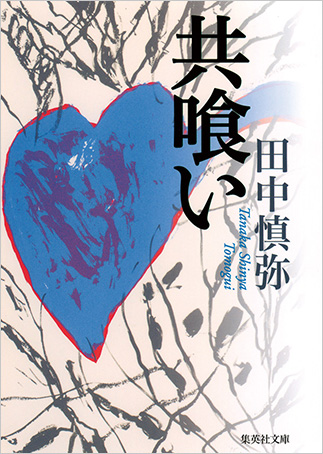
CHŪGOKU
Tomogui
[Cannibalism]
Shūeisha (Shūeisha Bunko), 2013. 205 pp. ¥420. ISBN 978-4-08- 745023-1.
Translation underway in: Korean
Seventeen-year-old Shinogaki Tōma lives with his father, Madoka, and his father’s common-law wife, Kotoko. His father’s sexual proclivities include choking and beating women, to the point of drawing blood. Tōma’s mother, Jinko, aborted her second pregnancy and left Madoka, unable to stand his brutality.
Now living alone, Jinko works as a fishmonger not far from Tōma’s home. Having lost her right hand in a wartime air raid, she uses an artificial hand to cut and clean fish. On his frequent visits to his mother, who provides him with fish and meals, Tōma has often heard about his father. Although he detests the man viscerally, Tōma is also afraid that he may have inherited his violent and sadistic tendencies. His fears come true when, during sex with his girlfriend, Chigusa, he impulsively strikes her in the face.
Consumed by self-disgust, Tōma sinks into depression. Meanwhile, Kotoko, who is now pregnant, makes up her mind to break free from Madoka. The violent father goes on a rampage, in the course of which he rapes Chigusa in the grounds of a Shintō shrine. Tōma resolves to kill his father, but Jinko stops him and takes matters into her own hands.
Summarized like this, the book may sound like a depiction of a grotesque world beyond reason, soaked in sex and violence. But the richly stylized prose and numerous descriptive passages that straddle the borderline between realism and fantasy combine to give the work a distinctive atmosphere and artistic flair. By setting his work in what is apparently Shimonoseki, Yamaguchi Prefecture, Tanaka effectively captures the life of this young man as he confronts his biological inheritance and inexorable fate. This is a compelling depiction of the powerful bonds between people and the pain they can cause, as well as the sense of entrapment and spiritual turmoil of the protagonist enmeshed in them. (CK)
Now living alone, Jinko works as a fishmonger not far from Tōma’s home. Having lost her right hand in a wartime air raid, she uses an artificial hand to cut and clean fish. On his frequent visits to his mother, who provides him with fish and meals, Tōma has often heard about his father. Although he detests the man viscerally, Tōma is also afraid that he may have inherited his violent and sadistic tendencies. His fears come true when, during sex with his girlfriend, Chigusa, he impulsively strikes her in the face.
Consumed by self-disgust, Tōma sinks into depression. Meanwhile, Kotoko, who is now pregnant, makes up her mind to break free from Madoka. The violent father goes on a rampage, in the course of which he rapes Chigusa in the grounds of a Shintō shrine. Tōma resolves to kill his father, but Jinko stops him and takes matters into her own hands.
Summarized like this, the book may sound like a depiction of a grotesque world beyond reason, soaked in sex and violence. But the richly stylized prose and numerous descriptive passages that straddle the borderline between realism and fantasy combine to give the work a distinctive atmosphere and artistic flair. By setting his work in what is apparently Shimonoseki, Yamaguchi Prefecture, Tanaka effectively captures the life of this young man as he confronts his biological inheritance and inexorable fate. This is a compelling depiction of the powerful bonds between people and the pain they can cause, as well as the sense of entrapment and spiritual turmoil of the protagonist enmeshed in them. (CK)

Translation rights inquiries
Shūeisha Inc.
(attn. Rights Dept., International Publishing Div.)
2-5-10 Hitotsubashi, Chiyoda-ku,
Tokyo 101-8050

